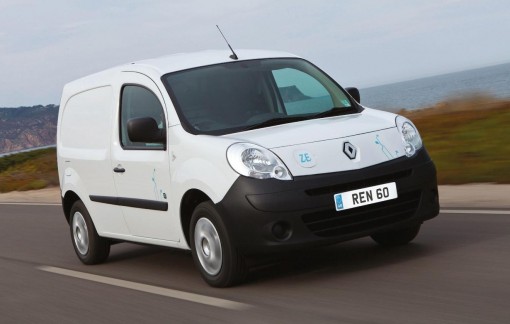Will Renault Kangoo EV ease business costs?

It isn’t an easy time to be the owner of a business which relies upon a vehicle fleet to carry out its operations, with fuel prices becoming an increasingly painful problem.
However, Renault is taking steps to ease this financial burden with the launch of the all-electric Renault Kangoo van which is set to be launched this summer.
Cheap in more ways than one
In terms of fuel savings, the Kangoo E.V. does exactly what it was designed to do with Renault estimating that it will cost just £2 per complete recharge. Even if this was to occur every day of the week, it would only cost £14. How does this compare with how much you spend each week to refuel each van in your fleet?
The one limitation that it has of course is the limited range between charges, with it being capable of just 106 miles; meaning that businesses will be unable to go to destinations more than 53 miles away from base without having to put up with a lengthy recharging period. However, Renault has defended its model claiming that only 70% of business’s travel more than 60 miles in their vehicles each day.
With this in mind, let’s start examining the potential fuel cost savings available to these businesses completing 60 miles per day and 300 miles per working week. With fuel prices at their current rates, it would cost approximately £48 per vehicle, per week to complete this mileage and about £2,450 per year. This works out as a potential saving of £1,722 per year for each vehicle in the fleet.
You would therefore expect the Kangoo E.V. to follow the trend set by other electric vehicles and be rather expensive to purchase initially. However, this is not the case with it costing just £13,592 from new; over £4,000 less than an equivalent conventionally fuelled Ford Transit.
Battery rental anomaly
It might all seem too good to be true, and quite frankly it is because Renault is the first manufacturer to impose a monthly battery rental charge on owners. The monthly fee has helped to make it affordable initially, but does create an additional monthly running cost fee of £62 or £744 per year which does eat quite heftily into the overall fuel savings. Nevertheless, owners of Kangoo E.V.’s will still be almost £1,000 better off each year.
This is also before tax and insurance savings are taken into account. The Kangoo E.V. is exempt from road tax charging and eligible to a 5% insurance discount with some insurance companies who are keen to promote green car usage according to MoneySupermarket. Overall, tax and insurance savings should reduce running costs by a further £470 for the average motorist.
Of course, this does not include Congestion charges, with Londoner’s for instance having to spend £10 for every day they take their vehicle into a zone covered by the charges. For businesses who are regularly forced to traverse into these areas, the Kangoo E.V. would therefore represent a significant running cost saving.
The best of the bunch
The Renault Kangoo E.V. is without doubt the best of a relatively uninspiring bunch at the moment, but it still represents a significant step forward for the industry. The monthly battery rental fee might be a source of criticism, but there is no getting away from the fact that Renault has become the first major manufacturer to produce an affordable and financially viable electric vehicle where the running costs are not overshadowed by the high initial purchase price.
A limited range of 106 miles between charges might seem a little bit frightening and Renault is the first to admit that the vehicle is not suitable for everyone, but it is still a big step forward. Another consideration will be by how much this range will be reduced if the van is forced to carry heavy goods.
A number of manufacturers, including Ford, have been investing in different forms of technology, such as vans which are fuelled by hydrogen, in the belief that the limited range of electric vehicles and more importantly the time it takes to recharge them, will ultimately prevent electric vehicles from becoming mainstream.
However, while the debate rages on, Renault has been the first major manufacturer to be confident enough in its fuel saving technology to mass produce an electric van and the savings on offer to business at a time of economic crisis are not to be sniffed at.
